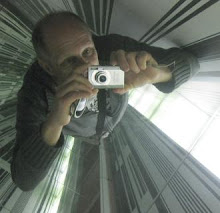This blog is a messy mix of different subjects, and is best navigated via the "Here By Label" section on the left. Subjects include troubleshooting Windows PCs, jembe drumming, and philosophical musings.
My other blog has a more effective category map on the right, or which Effing the Ineffable corresponds to this blog's The Waking Hour, both reflecting my philosophical interests.
In short, I am a secular fundamentalist with humanist characteristics. I revere uncertainty and disdain the flattery of the human-centric perspective. I thus weakly believe the objective external world to be real, and my inner self to be merely an emergent aspect thereof, and I'm happy with that.
My aim is to "re-build the mountain" to merge the Buddhist Heart Sutra, a channeled List of Ten from a friend of mine, my thinkings on complexity and infinity, the verified mathematics of quantum theory, everyday experience, various old but revered scriptures, and the practicalities of digital coding.
So far, so good; I've come a long way beyond these blogs, and some Big Questions don't seem so difficult anymore. Rather than "is there a God?", "what are we?", "what is consciousness?", "where do we go when we die?" etc., for me the big questions are "how do seemingly finite systems emerge from the infinite?" and "how do we share the same reality?".
I don't claim to have answers, just an understanding that makes sense to me, by not pretending we haven't learned anything in the last 100 years. As to "where do we go when we die?" I weakly believe the answer is much the same as that for an un-saved spreadsheet when the computer's power fails.
As I understand it, Buddhism states that nothing is fundamental, all is change; form is emptiness, emptiness is form. So, nothing is fundamental, everything is emergent, and everything that emerges may be as valid as anything else.
There may be no proper nesting of layers such that nothing is more "real" than anything else; causes and effects, parent and child may not be properly ordered as expect - it may just be "camera angles".
The List of Ten states "consciousness is fundamental", and the challenge is how to consider this objectively, without the flattery of human-centricity. The best way to get started on that is to define terms such as sentience, life, consciousness, etc. and seek out the "atom" of all this; the event.
An event has a pre- and post-state, with a process in between, as observed. So you have a duality of states, and adding a "cause" makes three; adding the observer makes four. If you treat these things in a generic way, you can interchange them to taste.
Each event is a process along a timeline that emerges from the process. Next up from that, we can treat and combine events via Not, Or, And and Xor logic gates, from which a variety of data models can emerge; streams of text characters, numbers, program code, media files etc.
If you take an Info Theory interpretation of Quantum Mechanics (where Quantum is just a fancy word for "one", i.e. a single countable microstate within a macrostate) then everything is a computer, with an address space populated by unknown vs. observed values, processes and processors, clock pulses of various scales to click the processing along, and interfaces to other things that might be sensed as inputs or printed as outputs. Add in the "maths of infinity" (spoiler alert; no arithmetic) and you get a fractal extensibility to everything.
The big question then becomes; why does "as above, so below" appear not to be true?
The answer may be one of scale - just as a human mathematician may not iterate a formula sufficient times to find patterns of chaos rather than the expected randomness, so it is that conservation laws and other rules only hold within a range of the big fractal pattern, and we can't see far enough to see that pattern eventually repeating itself.

No comments:
Post a Comment